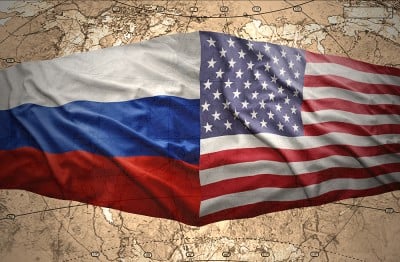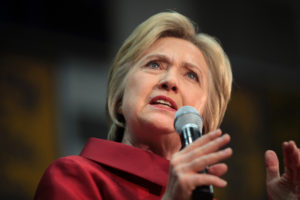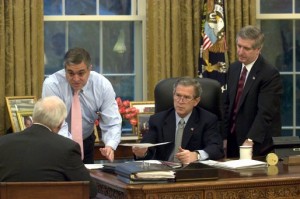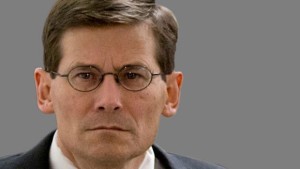Ex-CIA Mike Morell’s “Kill-Russians” Advice

Washington’s foreign policy hot shots are flexing their rhetorical, warmongering muscles to impress Hillary Clinton, including ex-CIA acting director Morell who calls for killing Russians and Iranians, notes ex-CIA analyst Ray McGovern.
Perhaps former CIA acting director Michael Morell’s shamefully provocative rhetoric toward Russia and Iran will prove too unhinged even for Hillary Clinton. It appears equally likely that it will succeed in earning him a senior job in a possible Clinton administration, so it behooves us to have a closer look at Morell’s record.
My initial reaction of disbelief and anger was the same as that of my VIPS colleague, Larry Johnson, and the points Larry made about Morell’s behavior in the Benghazi caper, Iran, Syria, needlessly baiting nuclear-armed Russia, and how to put a “scare” into Bashar al-Assad give ample support to Larry’s characterization of Morell’s comments as “reckless and vapid.” What follows is an attempt to round out the picture on the ambitious 57-year-old Morell.
Former Secretary of State Hillary Clinton speaking with supporters at a campaign rally in Phoenix, Arizona, March 21, 2016. (Photo by Gage Skidmore)
I suppose we need to start with Morell telling PBS/CBS interviewer Charlie Rose on Aug. 8 that he (Morell) wanted to “make the Iranians pay a price in Syria. … make the Russians pay a price in Syria.”
Rose: “We make them pay the price by killing Russians?”
Morell: “Yeah.”
Rose: “And killing Iranians?”
Morell: “Yes … You don’t tell the world about it. … But you make sure they know it in Moscow and Tehran.”
You might ask what excellent adventure earned Morell his latest appearance with Charlie Rose? It was a highly unusual Aug. 5 New York Times op-ed titled “I ran the C.I.A. Now I’m Endorsing Hillary Clinton.”
Peabody award winner Rose — having made no secret of how much he admires the glib, smooth-talking Morell — performed true to form. Indeed, he has interviewed him every other month, on average, over the past two years, while Morell has been a national security analyst for CBS.
This interview, though, is a must for those interested in gauging the caliber of bureaucrats who have bubbled to the top of the CIA since the disastrous tenure of George Tenet (sorry, the interview goes on and on for 46 minutes).
A Heavy Duty
Such interviews are a burden for unreconstructed, fact-based analysts of the old school. In a word, they are required to watch them, just as they must plow through the turgid prose of “tell-it-all” memoirs. But due diligence can sometimes harvest an occasional grain of wheat among the chaff.
President George W. Bush and Vice President Dick Cheney receive an Oval Office briefing from CIA Director George Tenet. Also present is Chief of Staff Andy Card (on right). (White House photo)
For example, George W. Bush’s memoir, Decision Points, included a passage the former president seems to have written himself. Was Bush relieved to learn, just 15 months before he left office, the “high-confidence,” unanimous judgment of the U.S. intelligence community that Iran had stopped working on a nuclear weapon in 2003 and had not resumed work on such weapons? No way!
In his memoir, he complains bitterly that this judgment in that key 2007 National Intelligence Estimate “tied my hands on the military side. … After the NIE, how could I possibly explain using the military to destroy the nuclear facilities of a country the intelligence community said had no active nuclear weapons program?” No, I am not making this up. He wrote that.
In another sometimes inadvertently revealing memoir, At the Center of the Storm: My Years at the CIA, CIA Director George Tenet described Michael Morell, whom he picked to be CIA’s briefer of President George W. Bush, in these terms: “Wiry, youthful looking, and extremely bright, Mike speaks in staccato-like bursts that get to the bottom line very quickly. He and George Bush hit it off almost immediately. Mike was the perfect guy for us to have by the commander-in-chief’s side.”
Wonder what Morell was telling Bush about those “weapons of mass destruction in Iraq” and the alleged ties between Saddam Hussein and Al Qaeda. Was Morell winking at Bush the same way Tenet winked at the head of British intelligence on July 20, 2002, telling him that “the intelligence and facts were being fixed around the policy” of invading Iraq?
High on Morell
Not surprisingly, Tenet speaks well of his protégé and former executive assistant Morell. But he also reveals that Morell “coordinated the CIA review” of Secretary of State Colin Powell’s infamous Feb. 5, 2003 speech to the United Nations – a dubious distinction if there ever was one.
So Morell reviewed the “intelligence” that went into Powell’s thoroughly deceptive account of the Iraqi threat! Powell later called that dramatic speech, which wowed Washington’s media and foreign policy elites and was used to browbeat the few remaining dissenters into silence, a “blot” on his record.
In Morell’s own memoir, The Great War of Our Time, Morell apologized to former Secretary of State Powell for the bogus CIA intelligence that found its way into Powell’s address. Morell told CBS: “I thought it important to do so because … he went out there and made this case, and we were wrong.”
It is sad to have to remind folks almost 14 years later that the “intelligence” was not “mistaken;” it was fraudulent from the get-go. Announcing on June 5, 2008, the bipartisan conclusions from a five-year study by the Senate Intelligence Committee, Sen. Jay Rockefeller described the intelligence conjured up to “justify” war on Iraq as “uncorroborated, contradicted, or even non-existent.”
It strains credulity beyond the breaking point to think that Michael Morell was unaware of the fraudulent nature of the WMD propaganda campaign. Yet, like all too many others, he kept quiet and got promoted.
Out of Harm’s Way
For services rendered, Tenet rescued Morell from the center of the storm, so to speak, sending him to a plum posting in London, leaving the hapless Stu Cohen holding the bag. Cohen had been acting director of the National Intelligence Council and nominal manager of the infamous Oct. 1, 2002 National Intelligence Estimate warning about Iraq’s [non-existent] WMD.
Former CIA deputy director Michael Morell.
Cohen made a valiant attempt to defend the indefensible in late November 2003, and was still holding out some hope that WMD would be found. He noted, however, “If we eventually are proved wrong — that is, that there were no weapons of mass destruction and the WMD programs were dormant or abandoned – the American people will be told the truth …” And then Stu disappeared into the woodwork.
In October 2003, the 1,200-member “Iraq Survey Group” commissioned by Tenet to find those elusive WMD in Iraq had already reported that six months of intensive work had turned up no chemical, biological or nuclear weapons. By then, the U.S.-sponsored search for WMD had already cost $300 million, with the final bill expected to top $1 billion.
In Morell’s The Great War of Our Time, he writes, “In the summer of 2003 I became CIA’s senior focal point for liaison with the analytic community in the United Kingdom.” He notes that one of the “dominant” issues, until he left the U.K. in early 2006, was “Iraq, namely our failure to find weapons of mass destruction.” (It was a PR problem; Prime Minister Tony Blair and Morell’s opposite numbers in British intelligence were fully complicit in the “dodgy-dossier” type of intelligence.)
When the storm subsided, Morell came back from London to bigger and better things. He was appointed the CIA’s first associate deputy director from 2006 to 2008, and then director for intelligence until moving up to become CIA’s deputy director (and twice acting director) from 2010 until 2013.
Reading his book and watching him respond to those softball pitches from Charlie Rose on Monday, it is hard to avoid the conclusion that glibness, vacuousness and ambition can get you to the very top of U.S. intelligence in the Twenty-first Century – and can also make you a devoted fan of whoever is likely to be the next President.
‘Wisdom’ on China
For those who did not make it to the very end in watching the most recent Michael-and-Charlie show, here is an example of what Morell and Rose both seem to consider trenchant analysis. Addressing the issue of U.S. relations with China, Morell described the following as a main “negative:”
U.S. Secretary of State John Kerry listens to Russian President Vladimir Putin in a meeting room at the Kremlin in Moscow, Russia, at the outset of a bilateral meeting on July 14, 2016. [State Department Photo]
“We both have large militaries in the same place on the planet, the Pacific. What does that mean? It means you have to plan for war against each other, and we both do; it means you have to equip yourself with weapons systems for war against each other, which both of us do; and it means you have to exercise those forces for war against each other, and both of us do. And both sides see all of three of those things. That leads to a natural tension and pulls you apart. …”Those who got to the end of Morell’s book had already been able to assimilate that wisdom on page 325:
“The negative side [regarding relations with China] includes the fact that … each country needs to prepare for war against each other (because our militaries are in close proximity to each other). Each plans for such a war, each trains for it, and each must equip its forces with the modern weaponry to fight it [leading] to tension in the relationship. …”
Well, Morell is at least consistent. More telling, this gibberish is music to the ears of those whom Pope Francis, speaking to Congress last September, referred to as the “blood-drenched” arms traders. Morell seems to be counting on his deep insights being music to the ears of Hillary Clinton, as well.
As for Morell’s claim that Russian President Vladimir Putin is somehow controlling Donald Trump, well, even Charlie Rose had stomach problems with that and with Morell’s “explanation.” In the Times op-ed, Morell wrote: “In the intelligence business, we would say that Mr. Putin had recruited Mr. Trump as an unwitting agent of the Russian Federation.”
Let the bizarre-ness of that claim sink in, since it is professionally impossible to recruit an agent who is unwitting of being an agent, since an agent is someone who follows instructions from a control officer.
However, since Morell apparently has no evidence that Trump was “recruited,” which would make the Republican presidential nominee essentially a traitor, he throws in the caveat “unwitting.” Such an ugly charge is on par with Trump’s recent hyperbolic claim that President Obama was the “founder” of ISIS.
Looking back at Morell’s record, it was not hard to see all this coming, as Morell rose higher and higher in a system that rewards deserving sycophants. I addressed this five years ago in an article titled “Rise of Another CIA Yes Man.” That piece elicited many interesting comments from senior intelligence officers who knew Morell personally; some of those comments are tucked into the end of the article.
Ray McGovern works with Tell the Word, a publishing arm of the ecumenical Church of the Saviour in inner-city Washington. He served as a CIA analyst from the administration of John Kennedy to that of George H.W. Bush, and prepared the President’s Daily Brief for Nixon, Ford, and Reagan. He is a member of the Steering Group of Veteran Intelligence Professionals for Sanity (VIPS).





![U.S. Secretary of State John Kerry listens to Russian President Vladimir Putin in a meeting room at the Kremlin in Moscow, Russia, at the outset of a bilateral meeting on July 14, 2016. [State Department Photo]](https://consortiumnews.com/wp-content/uploads/2016/07/28029406880_95fca7320d_k-300x201.jpg)